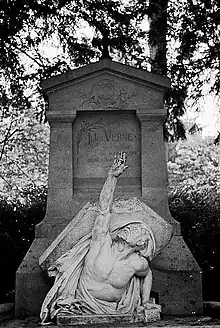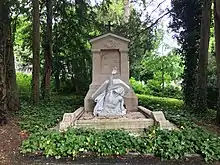Jules Verne's Tomb
The Jules Verne's Tomb is a grave memorial in Amiens, France La Madeleine Cemetery. It marks the grave of the 19th century writer Jules Verne. The sculpture was designed by Albert Roze and it depicts a man breaking out of his grave and reaching skyward. Verne died March 24, 1905, and the sculpture was added to the gravesite in 1907.
 | |
| 49.914167°N 2.284722°E | |
| Location | Amiens, Departement de la Somme, Picardie, France Section N |
|---|---|
| Designer | Albert Roze |
| Material | Marble |
| Beginning date | 1906 |
| Completion date | 1907 |
| Dedicated to | Jules Verne |
Background

In 1905 Jules Verne died in Amiens France, from chronic diabetes and complications from a stroke which paralyzed his right side.[2] and 2 years later his tomb featured a dramatic sculpture of a man pushing his way out of the earth reaching to the heavens. The sculpture is entitled "Vers l’immortalité et l’éternelle jeunesse" (“towards immortality and eternal youth”).[3][4] It was announced in January 1907 sculptor Albert Roze would erect a monument at the Jules Verne gravesite.[5]
The grave's sculpture has become a tourist attraction.[6] The city of Amiens also features the tomb on their tourist page.[7]
See also
References
- "Jules Verne's Tomb". Atlas Obscura. Atlas Obscura. Retrieved October 12, 2021.
- "Mr. Jules Verne Lies Dead at Amiens". Titusville Herald. March 15, 1905. Retrieved October 12, 2021.
- Lichfield, John (March 14, 2005). "Jules Verne: mythmaker of the machine age". The Independent. Retrieved October 12, 2021.
- Drabble, Margaret (June 24, 2021). "Submarine dreams: Jules Verne's Twenty Thousand Leagues Under the Seas". New Statesman. Retrieved October 12, 2021.
- "Monument to Jules Verne". South Haven Daily Tribune. January 5, 1907. Retrieved October 12, 2021.
- Sims, Chris (February 6, 2019). "Famous People with really Eccentric Graves". The Grunge. Gunge. Retrieved October 12, 2021.
- "La Madeleine Cemetery". Amiens. Amiens. Retrieved October 12, 2021.
Notes
- Sculptor Alber Roze created the sculpture from the actual death mask of Jules Verne. The sculpture was placed two years after Verne's death and is entitled, “Towards Immortality and Eternal Youth”.[1]